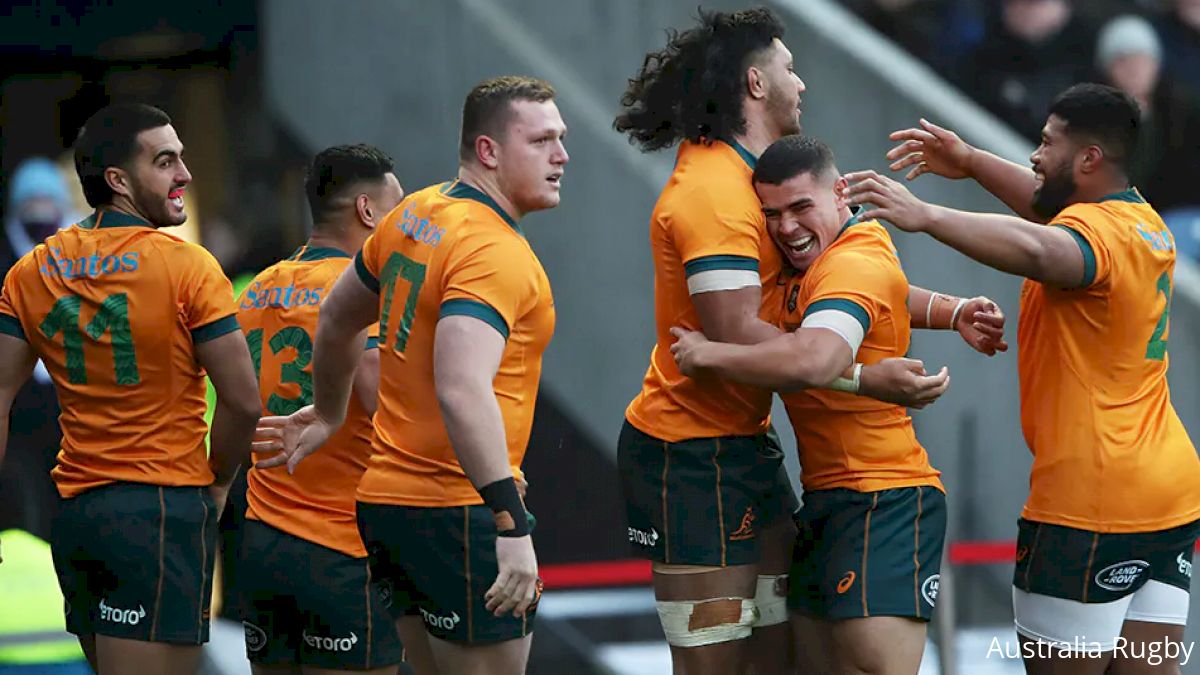Australia Preview: Wallabies Looking For Stability This Summer
Australia Preview: Wallabies Looking For Stability This Summer
The road to the 2023 Rugby World Cup begins this summer, and Australia has some things to sort through. There's no better time to start than now.

Australia may have a deserved place among the most successful rugby nations on the planet, but that doesn't mean the team hasn't gone through some strife.
The Wallabies are two-time Rugby World Cup champions, have been the national team of some of the greatest players to ever live and hold plenty of weight on the international level of the sport.
Still, recent form has seen Australia to be a step behind the current world's elite at times, something that likely doesn't sit well with those directly involved in the team and those supporting from afar.
The road to the 2023 Rugby World Cup begins this summer, and Australia undoubtedly has some things it needs to sort through. The best part about that, however, is that there's no better time to get going on that front.
What is there to watch out for in the Australian camp as it awaits a visit from England next month?
Here's a look at the Wallabies and what's been going on recently. Their meeting with the English will be streamed live on FloRugby.
A Shaky Time For Australian Rugby
Since former Chiefs and New Zealand U-20s coach Dave Rennie was appointed as Wallabies coach in November 2019, consistency has been Australia's major fault in the 20 matches he's led from the touchline.
Though Rennie's first full season slate in 2020 was a wild time for all in world rugby during the heights of the COVID-19 pandemic, the Wallabies' record at the conclusion of that year was 1-3-2, following four matches against New Zealand and two versus Argentina - both admittedly very formidable opponents.
Late 2021 was when things really started to get topsy-turvy.
Australia lost three tests to the All Blacks in August and September, went on a five-match winning run against South Africa, Argentina and Japan and then closed the year on another three-game losing streak.
The slate gets no easier this year, following a three-match home series with England, the always-competitive Rugby Championship and a string of end-of-year internationals, meaning the Wallabies must be night-in and night-out menaces over the next few months, if they want to establish some further confidence headed into a Rugby World Cup year.
Getting back the Ella-Mobbs Trophy from England - more on how Australia has fared in recent history against the English is below - would be a more than solid way to start the summer.
Can Aussies Break English Dominance?
It has been seven years since Australia last beat England in a rugby match, a period in which the English have won eight straight tests in the widest gap between Wallabies wins in the series since 1975-1984.
England's last three-match tour of the Land Down Under in 2016 was the stretch that started its win streak. Former Wallabies coach Eddie Jones swept Australia on their own turf, the first time the Wallabies lost every match of a home series since South Africa did it to them in 1971.
🏦 Another session in the bank.
— Wallabies (@wallabies) June 23, 2022
Grab your #AUSvENG 🎟 from https://t.co/WhF2arwRqO#Wallabies @eToroAU pic.twitter.com/nQQd4CHowI
England, however, doesn't appear to be like the world-beater it was in 2016, when it became the first country (other than New Zealand) in the modern era to win all of its matches in a calendar year.
Jones' side went trophyless in this year's Six Nations, as the country finished third and recently was battered 52-21 by the Barbarians in London, potentially signaling some disunity in the English camp ahead of preparations for the 2023 Rugby World Cup in France.
Perhaps it's the best time for Australia to strike back, then, but the Wallabies have their own recent struggles to work through, too. Though the country did play a tough schedule, Australia finished with the same amount of wins (seven) as losses in 2021, including three straight defeats to Home Nations (Scotland, England and Wales) to close out the year in the autumn internationals.
Wallabies Maneuver Around Squad Rules
Australia's national team selection policy severely limits the type of player Rennie can pick for international competitions, and it undoubtedly resulted in some tough decisions in forming the most recent 35-man squad.
Earlier this year, Rugby Australia updated its overseas player selection policy to where the national side is limited to having a cap of three players on the roster that don't play for an Australian Super Rugby team.
Most of the country's top players apply their trade at club level for qualifying teams anyway, but it does exclude nearly all Aussies that play club rugby elsewhere in the world.
With that limit in mind, Rennie went with a trio of players from the Japan Rugby League One - fly-half Quade Cooper, wing Marika Korobete and center Samu Kerevi - to join the Wallabies for England's visiting tour, though a number of talented and eligible players from the Japanese league missed out as a result, too.
Nonetheless, there's still a loaded crop of homegrown talent in the ranks, with plenty of usual names, such as captain Michael Hooper, a pair of Brumbies props in James Slipper and Allan Alaalatoa and Queensland Reds fly-half James O'Connor.
An interesting uncapped name in the squad, however, is wing Suliasi Vunivalu, who moved disciplines from rugby league to rugby union, after signing for the Reds following a period with the National Rugby League's Melbourne Storm.
Despite being born in Fiji and having represented the national rugby league team before, Vunivalu was eligible for selection due to the fact he had lived in Australia for the previous 36 months, allowing him to suit up for the Wallabies in accordance with World Rugby by-laws.